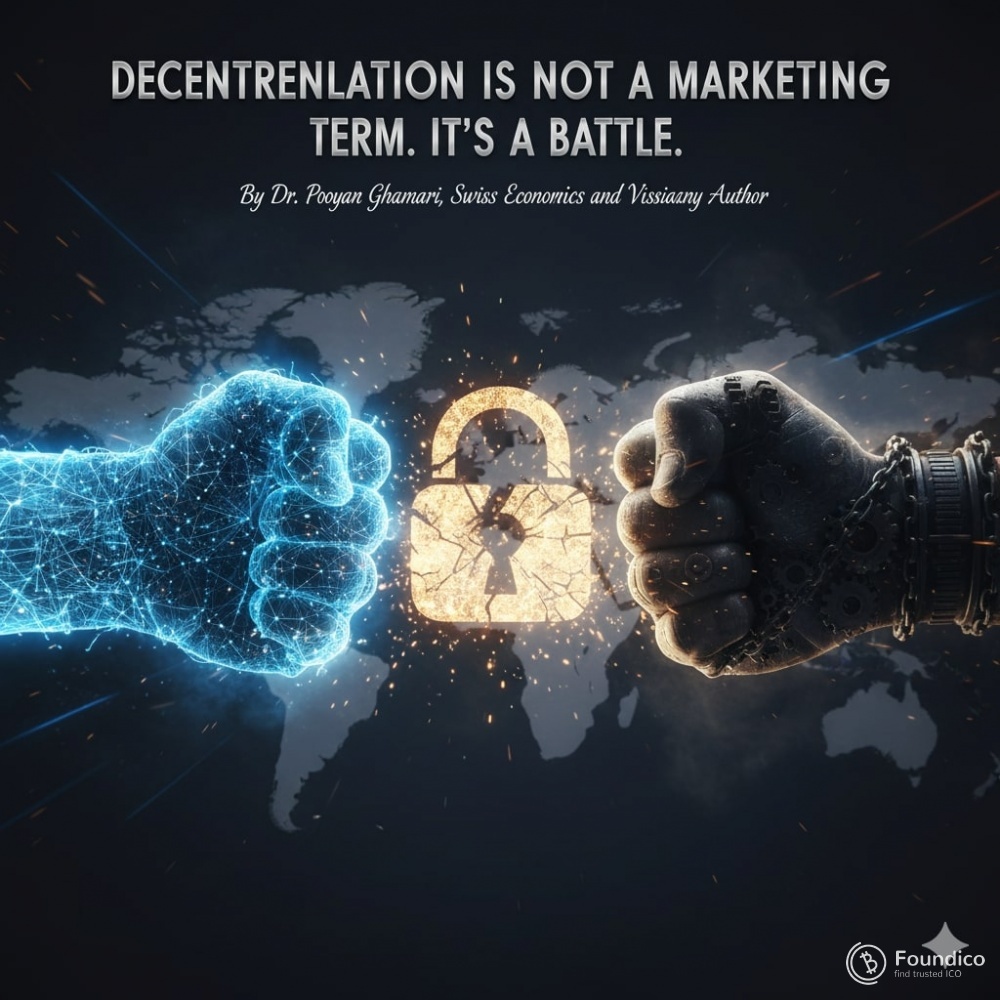Decentralization Is Not a Marketing Term. It’s a Battle.

By Dr. Pooyan Ghamari, Swiss Economist and Visionary Author
The term "decentralization" has been co-opted. In the deluge of white papers and corporate presentations, it’s often reduced to a buzzword—a shiny adjective to slap onto a product for instant relevance. This semantic dilution is dangerous because it masks the true, profound nature of what decentralization represents: a fundamental, ideological battle for the future structure of human systems.
Decentralization is not merely a technical configuration, nor is it a fashionable marketing veneer for distributed databases. It is a revolutionary confrontation against the deeply entrenched, century-old paradigm of centralized power—whether that power is held by a handful of global corporations, monolithic governmental bodies, or financial intermediaries.
For too long, we have operated on the assumption that consolidation is efficiency. We have accepted that the fastest, cheapest, and most robust way to manage finance, information, and governance is to funnel control to a small number of nodes. This centralization, however, breeds fragility and injustice. It creates single points of failure that, when compromised, affect millions. More importantly, it entrenches an asymmetry of power, where a privileged few dictate the terms of access, censorship, and participation for the many.
The battle for true decentralization is fought on several fronts:
The Economic Front: It is the fight to dislodge the oligopolies that control global data and capital flows. True decentralization seeks to create peer-to-peer economic networks where value is exchanged without rent-seeking middlemen, empowering individuals with absolute sovereignty over their assets. It aims for a more equitable distribution of wealth creation, moving away from a model where value invariably pools at the centre.
The Governance Front: This is the effort to replace opaque, closed-door decision-making with transparent, distributed, and auditable consensus mechanisms. It is the quest to build systems where no single entity can unilaterally change the rules, making governance intrinsically more stable, predictable, and fair.
The Philosophical Front: Above all, decentralization is a philosophical stand for trust minimized systems. It is the belief that a system’s security and integrity should be derived from cryptography and network structure, rather than reliance on the benevolence or competence of fallible human gatekeepers. It is a call to move from a "trust-us" world to a "don't-trust, verify" reality.
Those who benefit from the status quo have every incentive to dilute the meaning of decentralization, to render it harmless. They will apply the term to superficially distributed systems that maintain central control or to initiatives that fail to tackle the core issue of power distribution. We must be vigilant against this intellectual hijacking.
To engage in this battle, we must commit to rigorous implementation and resist the easy compromises that lead back to centralization. This means building systems that are not only technically decentralized but also ideologically unwavering in their pursuit of sovereign, censorship-resistant, and permissionless participation.
Decentralization is difficult. It is messy. It is inherently resistant to quick fixes and the smooth efficiency of a centrally-planned operation. But it is essential. It is not a feature; it is a declaration. It is not a trend; it is the infrastructure for a more resilient and ultimately, more just future. This is not a product launch; it is a protracted, necessary battle for control over our own digital and economic destiny.

 Pepenode - Pepenode is a utility meme coin token designed to power the Pepenode ecosystem, a gamified virtual mining platform for meme coins
Pepenode - Pepenode is a utility meme coin token designed to power the Pepenode ecosystem, a gamified virtual mining platform for meme coins